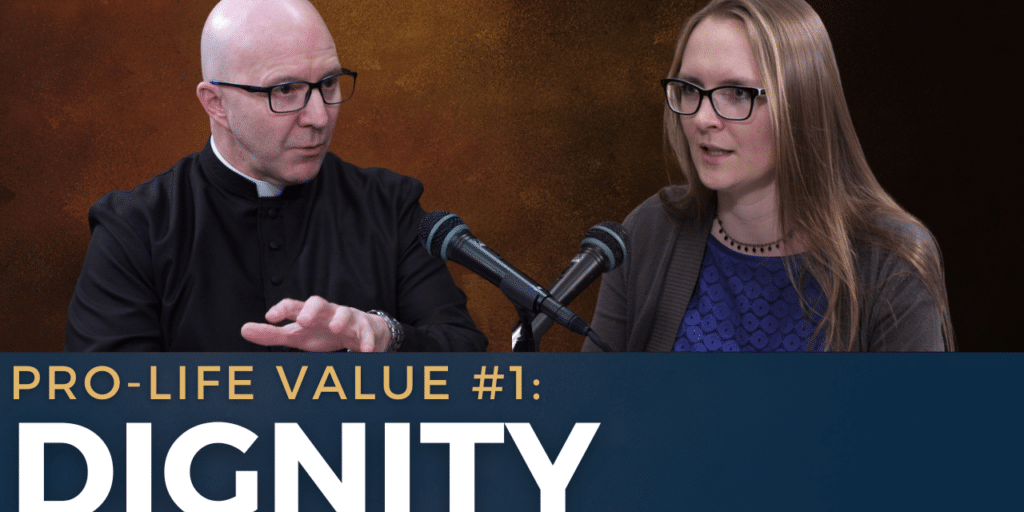The Message of Fatima, the Family, and the Crisis of Modesty
One hundred years ago, the sun danced. Nowadays you might read people like atheist Richard Dawkins dismissing the miracle in Fatima as a “mass hysteria.” Far more likely, however, you won’t hear about it at all. Or if you do, the media will be sure to give you only half the story.
And yet, the historical record is clear. The sun danced. And up to 70,000 people saw it. Secular newspapers reported it. Skeptical journalists and scientists who were present affirmed what they deemed to be impossible: the sun danced.
There has been nothing even remotely like it in modern history. At Fatima, Our Lady had a message for the world that was so urgent that she resorted to extraordinary means to grab our attention. And when people failed still to heed that message, the dreadful consequences she warned of followed close behind: another great war, persecutions, the annihilation of nations, and the spreading of the errors of Russia.
But what, exactly, was that message?
The Message of Fatima
To find out, let’s go back to that rainy morning of October 13, 1917, as three young peasant children gathered on a hillside in the countryside of Portugal. Throughout the morning tens of thousands of people arrived on foot, by car, and by train, from towns and cities far and near, drawn by the rumor of some great miracle to occur.
Shortly after noon, Our Lady appeared to the three children as she had promised, and as she had done five times before. During a brief conversation with them, she promised that the current war (World War I) would soon end, and revealed that she was the “Lady of the Rosary.”
And then she added: “People must amend their lives and ask pardon for their sins. They must not offend our Lord any more, for He is already too much offended!”
One of the children then asked: “And is that all you have to ask?” Our Lady affirmed: “There is nothing more.”
That’s it: Amend our lives, and ask pardon for our sins! Surely this is the self-same message preached by her Son, in the hills of Galilee, the voice crying in the wilderness, 2000 years ago: “Repent, for the kingdom of God is near!” (Matt. 4:17)
Fatima and the Attack on Morality
I have written about Fatima several times this year. I am writing about it one more time, because: we need the message of Fatima more than ever, a message that speaks directly to this dire fight to defend Life, Marriage, and Family.
I have written before about visionary Sr. Lucia’s warning to Cardinal Caffarra that the “final battle” between God and Satan would be the battle over marriage, and her assurance that “Our Lady has already crushed its head.” What I have not so far mentioned are the messages later given privately to some of the visionaries, which show that Our Lady was deeply concerned with the attack against morality, the consequences of which touch directly on the family.
“More souls go to Hell because of sins of the flesh than for any other reason,” she later told Jacinta. She also warned, “Certain fashions will be introduced that will offend Our Lord very much.” And she also issued a direct warning to women, saying: “Woe to women lacking in modesty.” And also: “Let men avoid greed, lies, envy, blasphemy, impurity.”
Alas! Even to mention a lack of “modesty” these days is to risk wrath. People become enraged upon being told that the way they dress and behave may be leading others to sin: they feel that their freedom is under attack. Often, too, women feel that they are being unfairly singled out, while men get a free pass. But this is only because at times we have adopted a far-too-narrow definition of “modesty” or “fashion.”
The Catechism of the Catholic Church has this to say about modesty:
Modesty protects the mystery of persons and their love. It encourages patience and moderation in loving relationships; it requires that the conditions for the definitive giving and commitment of man and woman to one another be fulfilled. Modesty is decency. It inspires one’s choice of clothing. It keeps silence or reserve where there is evident risk of unhealthy curiosity. It is discreet. – CCC, ¶ 2522
A friend of mine once told me how, a number of years ago, he visited a nightclub with several friends, including one who was a strikingly beautiful woman. The whole night, men who were strangers kept approaching this woman on the dance floor, attempting to behave with her in ways that I won’t describe. In this case, the woman wasn’t even provocatively dressed. It was the men who were displaying the lack of modesty, not in the way they dressed perhaps, but by their behavior.
Where in their behavior was the “patience” and “moderation” becoming of a gentleman? Where was the decency? Sadly, this has become the norm among many men, in part fueled by the ready availability of pornography.
Deadly Lack of Modesty
When we read that the Blessed Mother at Fatima condemned “certain fashions,” we are perhaps too apt only to think of certain fashions in women’s dress. And Our Lady very likely did have this in mind. But the word “fashion” is broader, referring not only to our choice of clothing, but also our behavior.
What would Our Lady think of the current “fashion” of men to squander hours every week lusting over pornographic images that are utterly degrading to women? Or what about the “fashion” of men to use social media apps to “swipe” to find no-commitment “hookups,” or the fashion of men to cohabitate with their girlfriends, with no intention of ever offering them the commitment and stability of marriage?
Or what about the “fashion” of school administrators and teachers to teach “sex-ed” classes to mixed classes that include the most obscene and graphic details about sexuality, without any reference to marriage or morality? Or what about the “fashion” of our politicians who support and march in public parades that celebrate nudity and graphic obscenity? Or the “fashion” of parents to bring their children to these parades, utterly destroying their innocence?
Though it may seem hyperbolic to say, it is provably true that our world is being literally torn apart at the seams by what might be termed a crisis of modesty, or “sins of the flesh.” Families are being torn apart by infidelity; women used, abused and abandoned for entertainment; children viewed as ‘inconveniences’ to be prevented with contraception; babies conceived in loveless, commitment-less relationships, and then aborted; children’s innocence stolen by pornography, and confusion about their sexuality sown at the youngest ages.
Our Lady warned us about this. And she warned of the consequences, not only in this world, but also in the next.
And yet, she did not leave us helpless or hopeless. For 100 years ago, the sun danced. And the promise that Our Lady made that summer to Lucia and the children is the same promise she makes to us: “I will be with you always, and my Immaculate Heart will be your comfort and the way which will lead you to God.”
It is only up to us to heed Our Lady’s message at Fatima, and to put it into effect in our lives. “Pray, pray a great deal,” Our Lady told the three children, “and make many sacrifices, for many souls go to Hell because they have no one to make sacrifices and to pray for them.”
Our Lady of Fatima: Pray for us.
As president of Human Life International, Fr. Boquet is a leading expert on the international pro-life and family movement, having journeyed to nearly 90 countries on pro-life missions over the last decade. Father Boquet works with pro-life and family leaders in 116 counties that partner with HLI to proclaim and advance the Gospel of Life. Read his full bio here.








worship of mary is not the message of the bible nor here, worship of mary is wrong wrong. please don’t be confused about this.
We do not ADORE Mary, and you know that, we VENERATE the Mother of God
You’re absolutely right! Worship of Mary is wrong and the Catholic Church prohibits it. Worship is for God the Father, Son and Holy Spirit only, and that is the Catholic Church’s teaching. The Church honors and venerates her because she is the Mother of God. There’s a big difference between worship and veneration. Here’s the definition (from Merriam Webster) of veneration: “respect or awe inspired by the dignity, wisdom, dedication, or talent of a person”. It’s unfortunate that so many non-Catholics still believe the lie that Catholics worship Mary. Where do lies come from? The father of lies: Satan. Talk about disinformation!!! To quote Jason Davis, “Please don’t be confused about this.”
St. Thomas Aquinas differentiates between Latria, which is the veneration due to God alone for his supreme excellence (adoration/worship), and dulia, which is reverence of a disciple for his master; dulia is the honor given to the angels and saints as friends of God; it is also what we give to Mary, the Mother of God.
Good points all, Mary!
One of the best articles I’ve read on Fatima and sin/modesty. I like the broader use of fashion here because there are many things that are “fashionable” besides clothing that is offensive to our Lord. Modesty is for women and men and requires a disposition of the soul that is ordered to what is true, good and beautiful in all areas of life. Thank you!
NO Modesty any more, Why, Why, Why.
The elite is pushing Immodesty dressing in church, the women are dressed as they are going to beach, men are dressed as they are working in backyard shed. Priest are forbidden to speak about it in the Homily.
Jesus is sadden that we come dressed disrespectfully to Sunday Mass.
We need to pray for those people. We need to educate those who don’t understand the since of the flash.
[…] HLI: The Message of Fatima, the Family, and the Crisis of Modesty […]
I agree that this topic of modesty should be talked about in the homilies, retreats, religious education and all other media, so the people get the message.
This is an excellent article for modesty for men and women both. This ought to include people who create clothes for women to wear that are often very immodest.
Nice Article.Our Lady of Fatima. Pray for us
I like the broader definition of “fashion” used here. I wonder though : why do priests never talk about this topic in homilies or pastors’ notes? Even just setting some ground rules for wedding dresses in church would be a start.
I am daily amazed at the revealing clothes being worn by news women. I don’t know what they have on from the waste down, but long sleeves don’t distract the viewer from the partially-exposed breasts.
Pray that we hear this message in our church homilies so families can be reinforced with the courage to practice and teach the truth about how we should live. Truth and Love is inspiring!
[…] Source: The Message of Fatima, the Family, and the Crisis of Modesty – Human Life International […]
[…] Source: The Message of Fatima, the Family, and the Crisis of Modesty – Human Life International […]
So true.
Just listened too to Bill Bennett speak of importance of
two questions in American society: 1. Who is teaching
our children. 2. What is being taught to them?
Get on your local school board or attend meetings!
Jill WA State
So true.
Just listened too to Bill Bennett speak of importance of
two questions in American society: 1. Who is teaching
our children. 2. What is being taught to them?
Get on your local school board or attend meetings!
Jill WA State